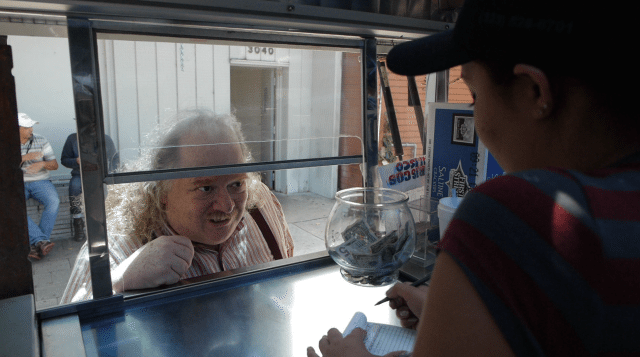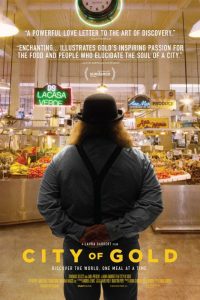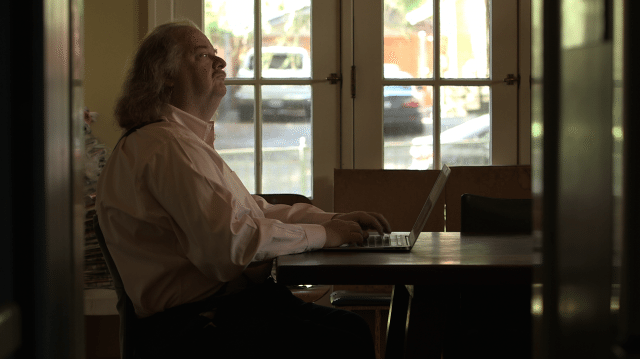

Thanks to his outspokenness and his idea of criticism as a democratic artform, Jonathan Gold has become one of the world’s most beloved food critics. He is the subject of Laura Gabbert’s documentary City of Gold, an impressionistic portrait of the Pulitzer prize-winning journalist, that sees him speaking of his love for Los Angeles, provides insight into his writing process, and above all takes real pleasure in showing Gold’s passion for food. As the film opens in theaters, I had the joy to sit with Mr. Gold and Ms. Gabbert to speak about their delightful documentary.
With Spotlight winning Best Picture at the Oscars it’s exciting to see films celebrating journalism once more, especially when we’re told all the time that print is dead and our profession is becoming obsolete. Why do you think it’s important that we celebrate that?
Jonathan Gold: I was absolutely stoked when I saw Spotlight, because for once the journalists weren’t the bad guys or the double dealers, or the ones who secretly had a drug ring, they were actually doing their job to have positive results even when it was personally difficult. Obviously restaurant isn’t anything like that, it’s neither arduous nor heroic, but thank you for bringing that up, because the film does show indirectly the process of journalism, how things like going to places, interacting with people and getting out of your comfort zone can lead to greater understanding.
 Laura, it’s hard to capture the process of writing, and your film shines a light on how that introspective that process is. It made the process feel tangible, like the camera was inside Jonathan’s head…
Laura, it’s hard to capture the process of writing, and your film shines a light on how that introspective that process is. It made the process feel tangible, like the camera was inside Jonathan’s head…
(Jonathan touches his head to see if it’s there)
Laura Gabbert: There was a concerted effort to tell our film from his point of view, I wanted the film to feel like what it feels like to read one of his reviews, which to me is an emotional journey. That was challenging because it’s hard to make writing cinematic, so we tried different things, from street scenes to the abstract. We didn’t set out to make a film about why criticism is important, but I think we discovered that while making it. At least it’s one of the things I discovered, I was struck by the rigor, the research and the care that goes into each of his reviews, and we wanted to show that.
Critics in media are usually perceived as villains who destroy the hard work of others. What do you tell people your job actually is, Jonathan?
Jonathan Gold: A critic’s job is to evaluate culture and to be able to put things into context for the readers. I’ve reviewed music, art, I was a film critic for a couple of years, and reviewing food isn’t that much different. You can’t take a plate of food by itself as if it was in a glass case, in a vacuum, and just pick it apart like that. It doesn’t exist like that, somebody made it, there’s a culture in which it exists, people think it’s worth paying for, people eat it and then shit it out the next morning. There’s that sense in which eating is the one biological function that we write about without censors getting in the way (laughs) and one of the things I also try to do is give people a visceral feeling of what the food is like, what they’re going to find when they get there, how the food will taste...and then I step outside of it and see it as an entity unto itself. A lot of the food criticism used to be “this is good”, “this is bad”, “watch out for the fish, except for the halibut”, and sometimes it’s like reading high school basketball scores, and eating isn’t anything like that, it’s an experience, an event of culture and it should be evaluated like that.
Laura, I wonder in the larger scheme of your works, where does Jonathan fit into this idea of a single person who can change the world through their work, as shown in Sunset Story and No Impact Man, for instance?
Laura Gabbert: From those movies this one is the most personal to me because his writing changed my point of view a lot. Whereas in Sunset Story I was interested in telling a history of the left through these women who were vital interesting individuals, but in this one I wanted to capture something emotional, not even that intellectual. The more intellectual ideas came from spending time with Jonathan.
Jonathan Gold: The film is sorta like Thirteen Ways of Looking at a Blackbird, and I liked that. There are so many documentaries trying to convince you of something and this one isn’t that, some people think message documentaries are the only ones worth making.
Laura Gabbert: The messages in this one came organically, any social issues that came through, came through in the process of making the film. Overt social films are kinda like preaching to the choir, who’s gonna go see those movies anyway but the people who already think that way and are just validating their point of view.
Jonathan Gold: Even Republicans can like it! (Laughs)
I wanted to talk about Republicans, because watching the movie and watching you have all that great Mexican food, it made me think of how people who are against immigration for instance never even sit to think for a second that they wouldn’t have access to so many foods if other people hadn’t brought them to America…
Jonathan Gold: Culture is always changing. People talk a lot about the concept of authenticity in cuisine - I’m sorta obsessed with it - but on one hand authenticity is great because it’s a hard line, but on the other hand it’s completely irrelevant. For example when you think about Italian food, you think of tomatoes, and tomatoes weren’t even eaten in Italy until the late 1800s, or until recently there were parts in Northern Italy where people wouldn’t be caught dead having tomatoes because they thought they were incredibly vulgar. The peppers that everyone think of as the main thing in Thai cuisine weren’t introduced into the country until very late in its history, it’s not part of their long history but there it is. We could actually point to the exact date that French fries were served in the USA, it was a banquet Thomas Jefferson was giving at the White House, he’d been introduced to potatoes by Benjamin Franklin, before then they were thought of as deadly and poisonous because they related them to the nightshade. Who knows, a Korean taco can become an acceptable kind of taco in twenty years, “al pastor” meat which is thought of a very Mexican was introduced by Lebanese immigrants in Puebla in the 20s. Now it’s hard to think of a great taqueria without “al pastor”.

We eat everyday, and writing about food is your work. You eat on days you’re not working too, so do you turn off your critic switch on days you’re off?
Jonathan Gold: I can’t actually turn it off which is bad, there was a point when I was at the Weekly, when I was writing about restaurants, movies, art, plays...one of the editors of the paper told me they thought it would be cool if I wrote a relationship column, and I said no “I want there to be one part of my life that is completely unexamined!” (laughs)
Laura, did spending time with Jonathan change your eating habits?
Laura Gabbert: I eat more spicy foods now, my tolerance has risen. I like really spicy now! For me it was fun to sit and eat with him and hearing him talk about food, or in his truck listening to him talk about how the city has changed.
Jonathan, you talk about how writers procrastinate in the film, so thanks. The film was a sort of guidebook to writing, were you two interested in maybe doing some sort of guide to teach people how to write about food?
Laura Gabbert: I never thought of that, I thought of many other side projects with Jonathan but not that one.
Jonathan Gold: It must be said that the procrastination side plot was not one I thought would be coming, it was not what I signed up for, now everytime I try to write a piece somewhere people will go “hmmm”...
Are there any cuisines you haven’t experienced properly?
Jonathan Gold: I know there is a kind of complexity and a wealth of flavors in Ghanaian real cuisine that’s never come here. I’ve had it at Ganaan friends houses, and I’d love to experience it in all of its splendor. The best of it is apparently hot enough to make Thai food feel like a walk in the park. There is also so much subtlety in Middle Eastern repertoire and most of what we get here are kebabs, so it would be really cool to see an Iranian restaurant cover the whole range of flavors
City of Gold opens in theaters on March 11.